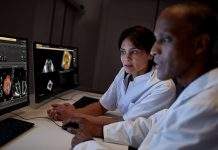
Royal Philips conducts a study on ischemic strokes and outlines evolutionary findings in the discipline of cardiovascular diagnosis. Also, they introduced BioTel Heart MCOT to help with cryptogenic strokes.
Royal Philips releases astonishing details on the evolutionary mobile cardiac outpatient telemetry (MCOT). This is supposed to be the clinical ambulatory screening solution of the first resort. It initially focuses on stroke patients who currently reside in their post-cryptogenic phase.
The research outlines a thirty days regular monitoring program. The BioTel Heart MCOT device by Phillips will be put in use. It is an implantable loop recorder (ILR). This will facilitate the betterment of atrial fibrillation (AF) detection rates. Because of improved anticoagulants, the progressive MCOT will lower the incidence of subsequent stroke.
Global Scenario of Heart Disease
As per the finding, one in every four adults above the age group of twenty-five will once in their lifetime have a stroke. So naturally, this calls for serious concern.
Ischemic strokes occur due to blood clot formation that blocks blood flow to the brain. They come from the category of cryptogenic. The means of the reason is still unknown.
In the cases of Ischemic strokes, diagnostics are required for post-stroke diagnostic work. But, again, it’s to figure out why and avoid a subsequent stroke from happening.
AF is a common risk factor for stroke, and it can raise the risk of a stroke by more than fivefold. It’s usually asymptomatic and only happens once in a while. This characteristic makes it very difficult for the patients to get diagnosed before.
MCOT promises to reduce the overall treatment costs
The study followed a 1,000-person stroke group for over a year. It was carried out to evaluate the expenses and results of two different monitoring systems.
It is fortunate to live in a world where such research analysis is accessible to doctors. The study aims to enhance the care of patients and healthcare system efficiencies. The research findings highlighted using the patch of an MCOT in the most redefined manner. The ILR took over half of the patients.
They were never diagnosed with AF results. The research looked toward lowering the entire cost of care. It amounted to be greater than US$ 4 million in total.
Compared to ILR alone, the research identified AF in 4.6% more individuals. It was enormous, and the comparison clarified a few points.
The implication of the use of MCOT
During the research, the diagnostic techniques used by doctors resulted in evolutionary modifications. The following assembly of patients also played a significant role. As a result, it was feasible to pinpoint the stroke’s cause. Also, it helps in devising all kinds of specific treatments.
This new study looks at how MCOT is used, making it the priority solution. It is also affordable and feasible this way.
The MCOT has been created to provide a level of diagnostic certainty. It is a crucial instrument in the detection and diagnosis of atrial fibrillation. It will thereby help in preventing a second attack of stroke.
Here, the sufferers or patients were tracked for thirty days. They were assigned to either of the monitoring arms of the model. Now, this arm model featured the patch arm of MCOT and ILR. It was for patients who had never been diagnosed with AF. The patients were part of the study for thirty days. And the other ILR arm was used as ILR alone.
Philips as a solution provider
Philips offers a wide range of medically tested ambulatory cardiovascular diagnostics. It used cutting-edge technologies to create it.
For example, the monitoring services were also a great concern for the stroke care solutions. The one that includes the analysis of data is unrivalled in the business. It has the potential to be a significant next step. It helps and makes the healthcare system more thorough by redefining healthcare management.
The solution serves as a more accurate and effective diagnosis. These solutions attempt to collaborate with technologies, information, and people throughout the stroke. They are in charge of creating cardiac care routes. It makes it easier for care teams to work quickly. It is more precise and provides the finest possible patient care. The latest study findings speak to the company’s unwavering commitment to healthcare advancement. In this business, there will be more innovation.
The study digs deeper to identify the frequent cause and ways to look for various symptoms. Philips will channel amazing technology in the name of MCOT to identify the second stroke for patients. Technology serves as a significant development in the cardiac care field. The HIMSS22 Global Health Conference and Exhibition also uploaded the whole array of cardiology treatments.






